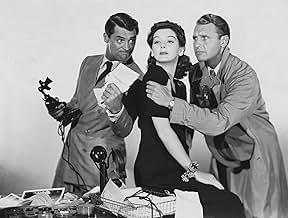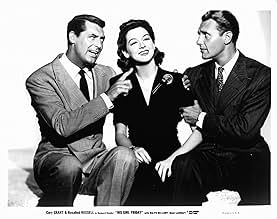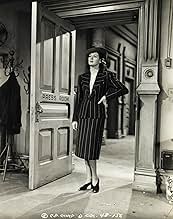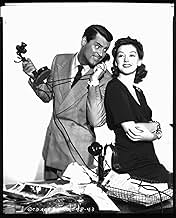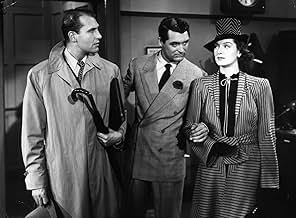Quando l'abile reporter Hildy Johnson annuncia di voler lasciare il mondo del giornalismo per dedicarsi completamente alla vita domestica, il suo editore, nonchè ex-marito, ricorre ad ogni m... Leggi tuttoQuando l'abile reporter Hildy Johnson annuncia di voler lasciare il mondo del giornalismo per dedicarsi completamente alla vita domestica, il suo editore, nonchè ex-marito, ricorre ad ogni mezzo per convincerla del contrario e per conquistare di nuovo il suo cuore.Quando l'abile reporter Hildy Johnson annuncia di voler lasciare il mondo del giornalismo per dedicarsi completamente alla vita domestica, il suo editore, nonchè ex-marito, ricorre ad ogni mezzo per convincerla del contrario e per conquistare di nuovo il suo cuore.
- Premi
- 2 vittorie e 1 candidatura in totale
Trama
Lo sapevi?
- QuizOne of the first films (preceded by Palcoscenico (1937)) to have characters talk over the lines of other characters, for a more realistic sound. Prior to this, movie characters completed their lines before the next lines were started.
- BlooperWhen Bruce Baldwin comes to the press room late in the movie, an electric fan and small shelf on the wall to the left of the door both completely disappear. Both have been there in all previous scenes and both reappear after this scene.
- Citazioni
[describing Bruce]
Walter Burns: He looks like that fellow in the movies - Ralph Bellamy.
- Curiosità sui creditiOpening credits prologue: It all happened in the "Dark Ages" of the newspaper game--when to a reporter "Getting that story" justified anything short of murder.
Incidentally you will see in this picture no resemblance to the man and woman of the press today.
Ready?
Well, once upon a time - -
- ConnessioniEdited into Michael Jackson's This Is It (2009)
There had been an earlier version of the play in the 1930s called THE FRONT PAGE, starring Adolphe Menjou as the conniving and devious Walter Burns, and Pat O'Brien as ace reporter Hildy Johnson. It is a good version, and both stars do well with their parts (and both have the verbal speed necessary for the dialog to flow over the ears of the audience). But when the film was remade in 1940, Howard Hawks decided to redraw Hildy Johnson into a female reporter (and previous wife) of Burns. His casting of Cary Grant was radically different too. Burns is a nasty, conniving s.o.b. who would kill for a good story. Menjou was somewhat dapper (he was usually dapper) in the role, but the hardness under the presentable shell was there. And by changing Hildy from a guy to a gal, and Walter's former wife, you had to make Walter look more interesting. So Walter is turned into Cary Grant. There was a search for Hildy, involving Jean Arthur and Irene Dunne as possibilities. Neither ended up playing him. Instead it went to Rosalind Russell.
It has to be admitted Russell had the vocal abilities to push the dialog at the proper clip. Possibly Jean Arthur could have done that just as well, but Arthur did not have the apparent physical strength behind the stylishness that Russell showed. She really does balance well (in this film) with Grant, given their characters.
Motivation changes a little. This Walter Burns still wants to get his scoops, but there are moments of fragility when he realizes he may forever lose Hildy to her fiancé Bruce (the ever helpless Ralph Bellamy). And they oddly work (Hawks manages to keep them under control). Also, as the story is now twelve years older than the original play, certain changes occur in Walter's political views. He does dislike the gang (led by Clarence Kolb and Gene Lockhart) running the city, and points out to Hildy that they have a chance to help give the city the sort of government New York City has under La Guardia. This does not end his joy at scooping the opposition, but it does suggest that Burns has more depth.
It is now generally believed that this is the best of the film versions of THE FRONT PAGE, and one of the funniest films ever made. The entire cast shines (look at the scene where Helen Mack confronts the reporters who have made her look like a tramp, and have told lies about John Qualen (Williams) - she is in a state when Russell takes her out of the press room, and the reporters are thoroughly ashamed of herself - and Russell comes back looking at Regis Toomey, Porter Hall, and the others, and says "Gentlemen of the Press!" with heavy cynical irony). And also note Billy Gilbert's immortal Joe Pettibone, the most hopeless monument of total befuddlement in movies. It is one of the few film comedies of that period that retains it's laughs one viewing following another.
- theowinthrop
- 7 mar 2006
- Permalink
I più visti
Dettagli
- Data di uscita
- Paese di origine
- Lingue
- Celebre anche come
- His Girl Friday
- Luoghi delle riprese
- Azienda produttrice
- Vedi altri crediti dell’azienda su IMDbPro
Botteghino
- Lordo Stati Uniti e Canada
- 296.000 USD
- Tempo di esecuzione1 ora 32 minuti
- Colore
- Proporzioni
- 1.37 : 1
Contribuisci a questa pagina




